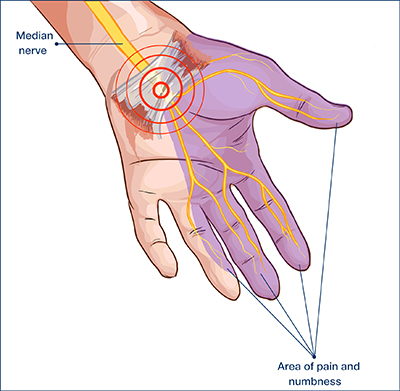Have you ever experienced numbness, tingling, or pain in the hand and fingers?
If so, you might have a common condition called carpal tunnel syndrome. Carpal tunnel syndrome occurs when the median nerve gets pinched as it travels through the carpal tunnel in the wrist. The carpal tunnel is a narrow passageway through which many finger and thumb tendons pass. Because so many structures pass through with no extra room, anything that causes the tunnel to narrow or the tendons to swell puts pressure on the median nerve. It is this pressure which causes the numbness, tingling or burning pain.
 Most patients with carpal tunnel syndrome describe these symptoms in the thumb, index, middle and ring fingers. Patients also can experience weakness or clumsiness in the hand and can find it difficult to button clothes or frequently drop things. Often, these symptoms begin gradually and intermittent, but can become constant. Commonly, patients will describe waking at night with these symptoms and that shaking their hands relieves them. Others describe symptoms occurring when driving or holding things tightly or for a prolonged period of time.
Most patients with carpal tunnel syndrome describe these symptoms in the thumb, index, middle and ring fingers. Patients also can experience weakness or clumsiness in the hand and can find it difficult to button clothes or frequently drop things. Often, these symptoms begin gradually and intermittent, but can become constant. Commonly, patients will describe waking at night with these symptoms and that shaking their hands relieves them. Others describe symptoms occurring when driving or holding things tightly or for a prolonged period of time.
Carpal tunnel syndrome is caused by a variety of factors. Women and older individuals are more likely to develop the condition. Repetitive hand use and extreme hand and wrist positions over prolonged periods can increase pressure on the nerve. Hormonal changes during pregnancy can lead to the condition. Patients with diabetes, rheumatoid arthritis, and thyroid gland dysfunction all have an increased incidence of carpal tunnel syndrome.
On physical examination, your doctor will carefully test the sensation in your fingertips, understand what reproduce your symptoms, and test for weakness of your thumb muscles. In more severe cases, these thumb muscles may become visibly smaller. You might also be sent for electro-diagnostic tests such as an electromyogram (EMG) which helps to determine the severity of the condition and to understand all the causes of the symptoms.
Initial treatment includes wearing a wrist brace at night, which helps to keep you from bending your wrist during sleep. Modifying any activities which aggravate symptoms is helpful. Non-steroidal anti-inflammatory medications (NSAIDs) and physical therapy can help with pain and inflammation. Lastly, cortisone, strong anti-inflammatory medications, can be injected into the carpal tunnel and can often provide at least temporary relief.
If nonsurgical treatment does not relieve your symptoms, your doctor may recommend surgery. Surgery for carpal tunnel syndrome is an outpatient procedure done under a local anesthetic. During the procedure, a small incision is made on your palm to open the roof of the carpal tunnel. This relieves the pressure on the median nerve, and for most patients, greatly improves their symptoms.
For more questions on carpal tunnel syndrome or if you think you might have the condition, please contact your McBride physician.
